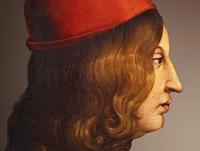Like many other aristocrats, Giovanni Pico della Mirandola also enrolled at the Alma Mater Studiorum without obtaining a degree. The ancient University of Law still attracted young students from all over Europe, perhaps, as in the case of Pico, because it offered them the opportunity to come into contact with philosophers, doctors and astronomers, professors of the most modern and up-to-date University of the Arts.
 Giovanni Pico of the Counts of Mirandola and Concordia, universally known as Giovanni Pico della Mirandola, was born in the capital of a small but strategic state near Modena, Mirandola. His father was the city’s Signore and the Count of Concordia, Gianfrancesco I Pico, while his mother, Giulia Boiardo, was the daughter of Feltrino, Count of Scandiano.
Giovanni Pico of the Counts of Mirandola and Concordia, universally known as Giovanni Pico della Mirandola, was born in the capital of a small but strategic state near Modena, Mirandola. His father was the city’s Signore and the Count of Concordia, Gianfrancesco I Pico, while his mother, Giulia Boiardo, was the daughter of Feltrino, Count of Scandiano.
At the age of four, Giovanni lost his father and, as the youngest child, was home-schooled, taking in the eclectic, lively culture typical of the courts of the Po Valley at the end of the 15th century.
At the age of fourteen, in 1477, he enrolled at the University of Bologna to study Canon Law. However, Pico didn’t stay long enough to obtain his degree and, only two years later, in 1479, he moved first to Ferrara, where he met Savonarola and Guarini, then from 1480 to 1482 to Padua, where he approached the Aristotelian philosophy and its Averroistic interpretation.
In 1482, he headed off for Pavia, where he broadened his philosophical knowledge and started to learn the Greek language. In Florence, in 1484, he met Ficino, with whom he immediately established an intellectual affinity that would later lead him to become a leading figure in the local Neoplatonic Academy.
After a short stay in France (1485), he headed to Rome, where he wanted to hold an important conference, bringing together philosophers, clerics and intellectuals from all disciplines, with the aim of establishing a common, universal culture, a beacon of concord and peace for all mankind. During this period he learned Hebrew and Chaldean, also thanks to his proverbial memory.
He then drafted 900 theses that would have been discussed in 1486 if, once printed, they had not been deemed dangerous by a papal commission. The latter censured 13 of them, considering them heretical, and expected Pico to officially renounce the theses as a whole. Instead, in 1487 he published an Apology, in which he accused his judges and thus antagonised Pope Innocent VIII.
He attempted to escape from the Roman curia, but they caught up with him in France and had him arrested in 1488. It was only with the intermediation of Lorenzo the Magnificent that Giovanni Pico was freed and finally settled in Florence. In the villa in Fiesole where the Signore of Florence had welcomed him, he wrote his most important works.
These include: the Heptaplus (1489), a sophisticated philosophical and cabalistic study of cosmogony through an interpretation of the first 26 verses of the Genesis; the Expositiones in Psalmos (1489), once again an in-depth study of philosophy and religion; the De ente et uno (1491), dedicated to Poliziano, the apex of that speculation that seeks to combine Platonism with Aristotelianism; the Epistole (1492), through which Pico put himself forward as a mentor to his nephew Giovanni Francesco; and the Disputationes adversus astrologiam divinatricem (1493), in which the scientific nature of Astronomy is set apart, for the first time, from the falsehood of Astrology.
The latter writing was needed as a corollary to the oration De hominis dignitate (1486), which was supposed to have opened the Roman philosophical congress. In it, certainly Pico's most important text, Man is elevated to a microcosm, at the centre of the universe, endowed with free will and thus capable of rising to angel and God, or of corrupting himself into bestiality. The human spirit thus binds the two opposite extremes, soul and body, in a will that tends to reunite with God.
Although Ficino’s concept of concord and the Platonic concept of God, understood as beginning and end, is latent in Pico, his thinking is joyfully contaminated by Aristotelian Averroism, the Jewish Kabbalah, Christian Patristics and Scholasticism, and even esoteric, magical and hermetic suggestions.
This constant striving for union and harmony between the philosophies and religions of all times gradually faded during his Florentine stay, especially since here Pico came into intimate contact with Savonarola and his spiritual reform. As a result, his universal ideal became circumscribed to the city’s present, and the sage’s goal became coincident with that of saint. Turmoil and deprivation burst into the humanist idyll, increasingly distancing Pico's thinking from that of Ficino.
Had it not been for his premature death in 1494 (Pico was only 31 years old when he died), the Renaissance philosopher would probably have taken his vows and joined the Dominican order.
